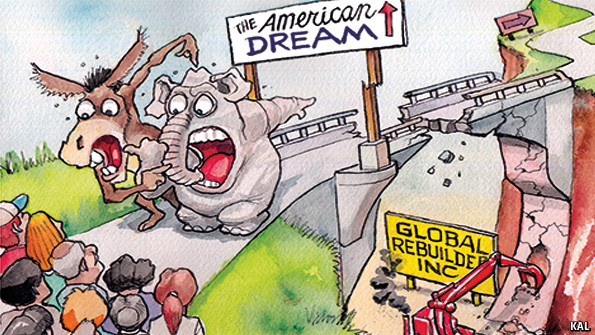Beneath the Policies
Interestingly enough, I just wrote my essay on the American Dream's ever-changing nature throughout history and how presidential candidates were a reflection of the importance of it. So I had to read the chapter titled "The Politics of the American Dream, 1980 to 2008" by Michael C. Kimmage in The American Dream in the 21st Century, as it really related to the essay I just wrote. Kimmage's main claim in the chapter is that "[t]he political party in closer touch with the American Dream is more likely to acquire and to hold on to power" (28). And after reading the chapter... heck yeah, it totally makes sense.
Kimmage analyzed many elections from the past, going as far back as the 1930s, where Roosevelt was elected. Not only did Roosevelt embody the American Dream in terms of how he "contracted polio and persevered" (29), but he was extremely optimistic. His optimism was key to his success, and Kimmage maintains that remaining optimistic about the American Dream is extremely important. Which makes me wonder about the 2016 election. Both Donald Trump and Hillary Clinton just bashed each other all the time, calling each other out. And they definitely had policies that they talked about, but people will remember this election for how the two candidates hurled insults at each other, not for their charisma or total embodiment of part of the American Dream. So did Americans not care about the American Dream as much? What specifically drew voters to these two candidates.
Both Clinton and Trump seemed pretty pessimistic. And Kimmage also claims that pessimism is something that can bring a candidate down, as it did with Jimmy Carter in the 1980 election against Ronald Reagan. Carter simply lacked "FDR's talent for balancing optimism and pessimism" (32). Just like a candidate needs to balance these two things, the American Dream in it's material and moralistic/spiritualistic aspects need to be balanced. Balance is a recurring theme here. Anyways, what I wanted to point out was the fact that neither Trump nor Clinton really balanced either well. They both seemed pretty darn pessimistic to me. So is balancing both really that important, or do candidates just play off of what they know the climate is like in America at the time? Americans were pretty angry during the 2016 election, so it made sense why they were pessimistic, in my opinion.
Going off of that point (that candidates play off of what they feel people are feeling), Kimmage discusses how Reagan recognized that scaling back the government was of utmost importance. He peeled back the New Deal's emphasis on the government's involvement, recognizing people were fed up with it. So Kimmage claims that Reagan was successful because he was "pessimistic about the federal government" (33). So again, it is all about balancing optimism and pessimism, knowing what to be optimistic about, and what to be pessimistic about.
I am definitely interested in doing more research about the rhetoric surrounding each election, and how candidates appealed to certain aspects of the American Dream, how the balanced pessimism and optimism, and anything else that could've shifted the votes in their favor.


Alex, I liked how passionate your blog post was as you were able to connect it to your recent paper and the 2016 election. When I think of the presence of the American Dream in politics, I find myself thinking back to Fisher's article, "Reaffirmation and Subversion of the American Dream", in which Nixon and McGovern embodied the two myths of the Dream. For example, Nixon embodied the materialistic dream as he ran on the premise of "reelect the president!" and advocated for actions of individualism. Also, McGovern embodied the moralistic myth as he attempted to evoke Americans with feelings of guilt and promised immense change. I think that Trump and Clinton attempted to embody these myths, but failed as they took to bashing each other and forcing America to pick their poison in a sense. Overall, I enjoyed reading your commentary and I think your research paper will be very interesting!
ReplyDeleteI read the chapter 3 of the presidents and the making of the American Dream and I see the in both chapters. For instance, my chapter also mentions FDR's optimism. Roosavelt constantly said that the nation would endure during the Great Depression and that was perfect. Can you just imagine Donald Trump as president during the Depression. He would probably be constantly so pessimistic blaming other people and making the matters worse.Then, your chapter seems to discuss the Presidents appealed to the American Dream. My chapter discusses directly, how the President appeal and create the American Dream.The president is no doubt the Greatest influence in the perspective of the American Dream
ReplyDeleteWhen initially glancing over titles on the Table of Contents page of The American Dream in the 21st Century , I did not consider reading this chapter. However, reading your blog about this article and the ideas within it intrigues me, especially when you emphasize that the author analyzed several elections from history. I like how you introduced an open-ended question concerning this past presidential election because it is something that grasps the attention of everyone due to it being heavily relevant in American society, and because it forces your readers to think beyond the chapter if they have read it as well. I also like seeing that you are interested in continuing your research regarding this subject even after writing your last paper on a similar topic and reading this chapter. It shows that you are genuinely interested in this topic rather than treating it solely as a centerpiece of an assignment.
ReplyDelete